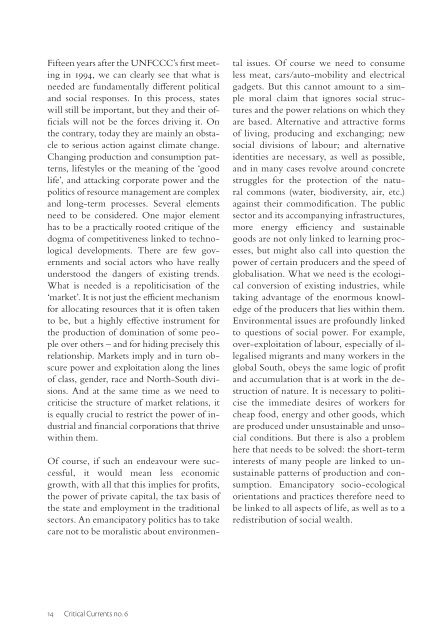Contours of Climate Justice - Dag Hammarskjöld Foundation
Contours of Climate Justice - Dag Hammarskjöld Foundation
Contours of Climate Justice - Dag Hammarskjöld Foundation
You also want an ePaper? Increase the reach of your titles
YUMPU automatically turns print PDFs into web optimized ePapers that Google loves.
Fifteen years after the UNFCCC’s fi rst meeting<br />
in 1994, we can clearly see that what is<br />
needed are fundamentally diff erent political<br />
and social responses. In this process, states<br />
will still be important, but they and their <strong>of</strong>fi<br />
cials will not be the forces driving it. On<br />
the contrary, today they are mainly an obstacle<br />
to serious action against climate change.<br />
Changing production and consumption patterns,<br />
lifestyles or the meaning <strong>of</strong> the ‘good<br />
life’, and attacking corporate power and the<br />
politics <strong>of</strong> resource management are complex<br />
and long-term processes. Several elements<br />
need to be considered. One major element<br />
has to be a practically rooted critique <strong>of</strong> the<br />
dogma <strong>of</strong> competitiveness linked to technological<br />
developments. There are few governments<br />
and social actors who have really<br />
understood the dangers <strong>of</strong> existing trends.<br />
What is needed is a repoliticisation <strong>of</strong> the<br />
‘market’. It is not just the effi cient mechanism<br />
for allocating resources that it is <strong>of</strong>ten taken<br />
to be, but a highly eff ective instrument for<br />
the production <strong>of</strong> domination <strong>of</strong> some people<br />
over others – and for hiding precisely this<br />
relationship. Markets imply and in turn obscure<br />
power and exploitation along the lines<br />
<strong>of</strong> class, gender, race and North-South divisions.<br />
And at the same time as we need to<br />
criticise the structure <strong>of</strong> market relations, it<br />
is equally crucial to restrict the power <strong>of</strong> industrial<br />
and fi nancial corporations that thrive<br />
within them.<br />
Of course, if such an endeavour were successful,<br />
it would mean less economic<br />
growth, with all that this implies for pr<strong>of</strong>i ts,<br />
the power <strong>of</strong> private capital, the tax basis <strong>of</strong><br />
the state and employment in the traditional<br />
sectors. An emancipatory politics has to take<br />
care not to be moralistic about environmen-<br />
14 Critical Currents no. 6<br />
tal issues. Of course we need to consume<br />
less meat, cars/auto-mobility and electrical<br />
gadgets. But this cannot amount to a simple<br />
moral claim that ignores social structures<br />
and the power relations on which they<br />
are based. Alternative and attractive forms<br />
<strong>of</strong> living, producing and exchanging; new<br />
social divisions <strong>of</strong> labour; and alternative<br />
identities are necessary, as well as possible,<br />
and in many cases revolve around concrete<br />
struggles for the protection <strong>of</strong> the natural<br />
commons (water, biodiversity, air, etc.)<br />
against their commodifi cation. The public<br />
sector and its accompanying infrastructures,<br />
more energy effi ciency and sustainable<br />
goods are not only linked to learning processes,<br />
but might also call into question the<br />
power <strong>of</strong> certain producers and the speed <strong>of</strong><br />
globalisation. What we need is the ecological<br />
conversion <strong>of</strong> existing industries, while<br />
taking advantage <strong>of</strong> the enormous knowledge<br />
<strong>of</strong> the producers that lies within them.<br />
Environmental issues are pr<strong>of</strong>oundly linked<br />
to questions <strong>of</strong> social power. For example,<br />
over-exploitation <strong>of</strong> labour, especially <strong>of</strong> illegalised<br />
migrants and many workers in the<br />
global South, obeys the same logic <strong>of</strong> pr<strong>of</strong>i t<br />
and accumulation that is at work in the destruction<br />
<strong>of</strong> nature. It is necessary to politicise<br />
the immediate desires <strong>of</strong> workers for<br />
cheap food, energy and other goods, which<br />
are produced under unsustainable and unsocial<br />
conditions. But there is also a problem<br />
here that needs to be solved: the short-term<br />
interests <strong>of</strong> many people are linked to unsustainable<br />
patterns <strong>of</strong> production and consumption.<br />
Emancipatory socio-ecological<br />
orientations and practices therefore need to<br />
be linked to all aspects <strong>of</strong> life, as well as to a<br />
redistribution <strong>of</strong> social wealth.
















